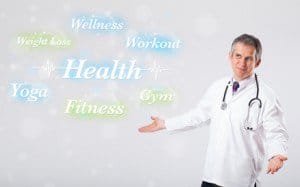
Having the right exercise & diet intake is essential for your health, but having emergency response in the event of an accident is peace of mind.
You may notice as you age that you can no longer eat the same amounts and types of food you used to enjoy without experiencing unwanted digestive issues or weight gain. This is because your metabolism slows down as you age. Since you need to take in less food as you get older, it becomes increasingly important to make sure the food you are eating is as nutrient dense as possible.
The following is a list of the most important nutrients to have in your diet.
Be sure to check with your doctor before following any of the advice listed below.
- Water– You might find your sense of thirst decreasing as you age, so you shouldn’t necessarily wait until you feel thirsty to drink this important liquid. Keep a water bottle with you at all times and take sips throughout the day. Water helps your body stay hydrated, digest food, absorb nutrients, and pass waste. It is essential to your health.
- Vitamins and Minerals– Vitamins and minerals help your body to function properly, from fighting off infections, to helping your blood to clot. The following are especially important for people over the age of 50.
Please check with your doctor before taking any of the following:- Vitamin B6 – Women need 1.5 mg per day, and men need 1.7 mg per day
- Vitamin B12 – Everyone needs 2.4 mcg per day
- Folate – Everyone needs 400 mcg per day
- Vitamin D – Those 50-70 need 600 IU per day, and those over 70 should take a minimum of 800 IU, but no more than 4,000 IU
- Calcium – Women age 51 and over need 1200 mg per day, men ages 51-70 need 1000 mg per day, and men 71 and over need 1200 mg each day.
- Sodium – While needed in your diet, it should be restricted to 1500 mg per day for those 51 and over to decrease risk for high blood pressure, heart disease, kidney disease, and stroke
- Fats– Ingesting healthy amounts of monounsaturated and polyunsaturated fats can lower your chance of heart disease. These types of fats can be found in avocados, peanut butter, walnuts, and fatty fish.
- Carbohydrates– Complex carbohydrates, such as those found in beans, rice, pasta, cereal, and bread, are a good source of energy for your body. They are also usually high in fiber, which can help naturally lower blood sugar and cholesterol.
- Proteins– Finally, proteins are essential to helping your body fight infection and build and repair tissue. Healthy sources of protein include soy, eggs, seafood, lean meat and poultry, unsalted nuts and seeds, and beans.


